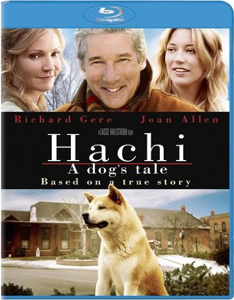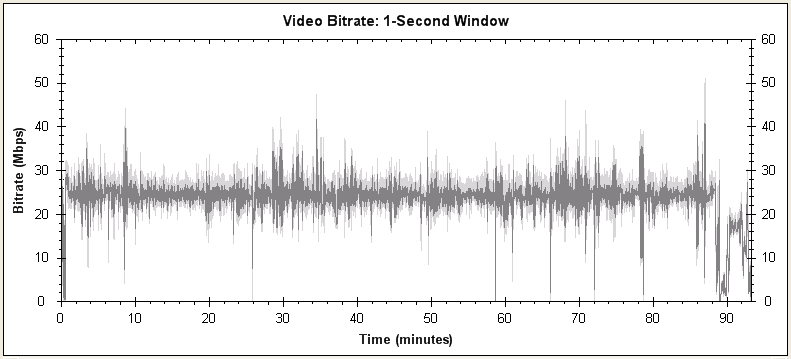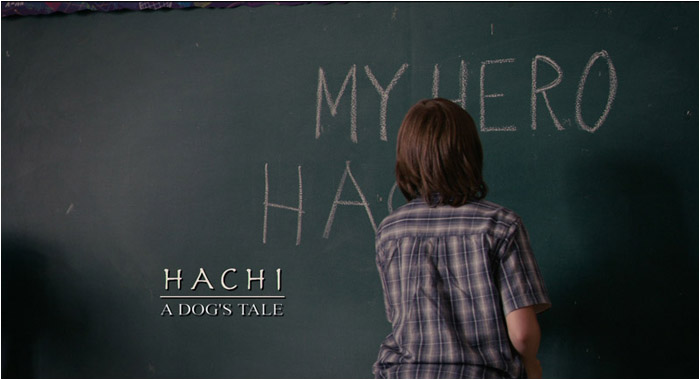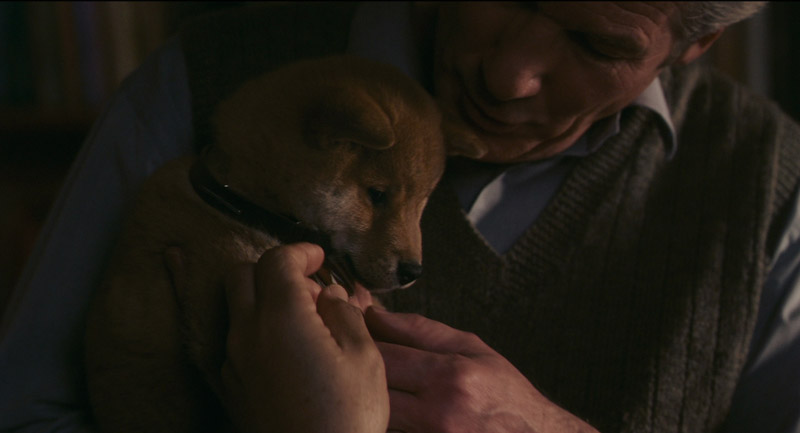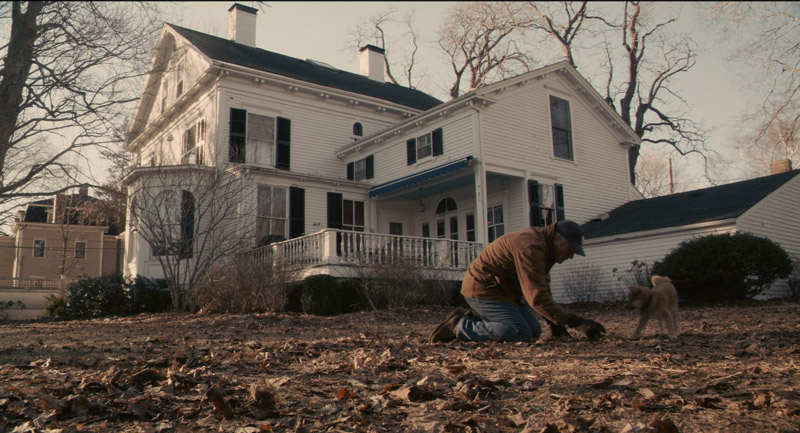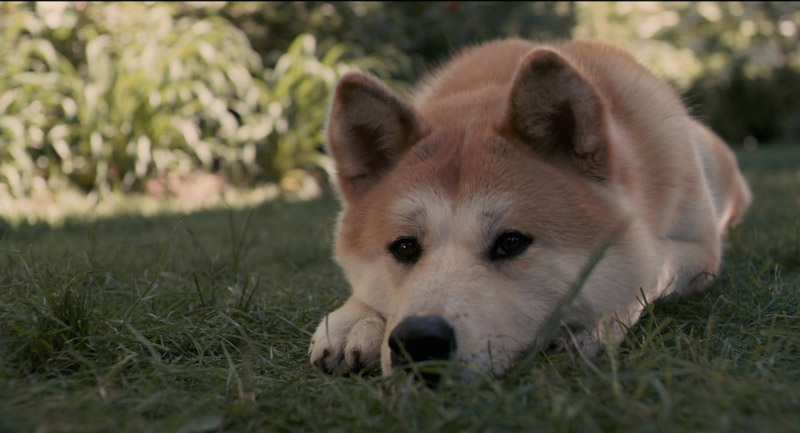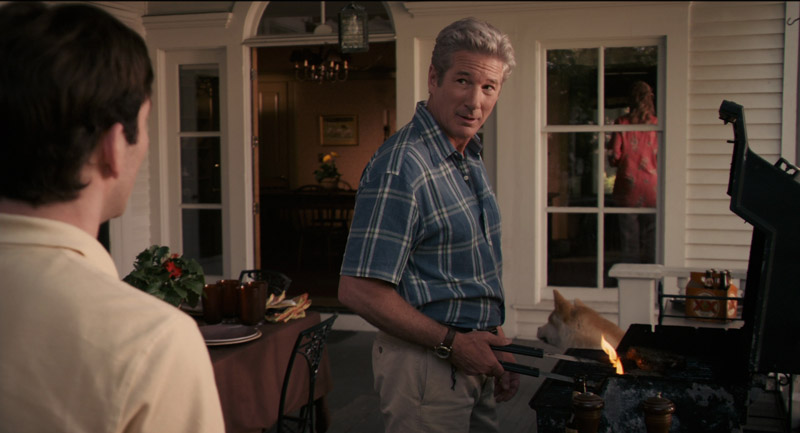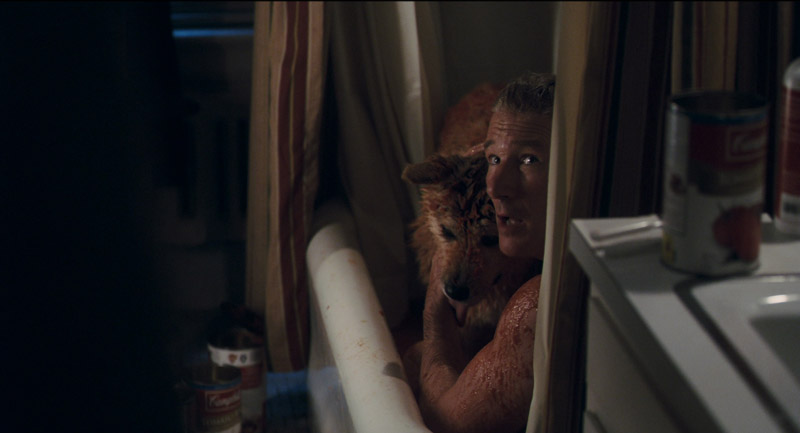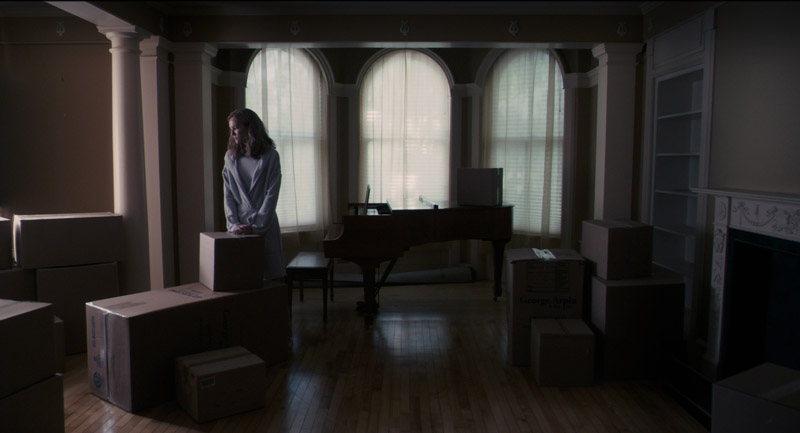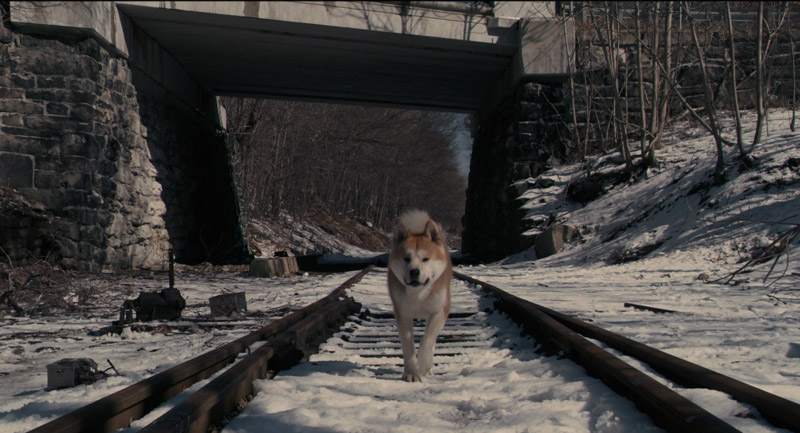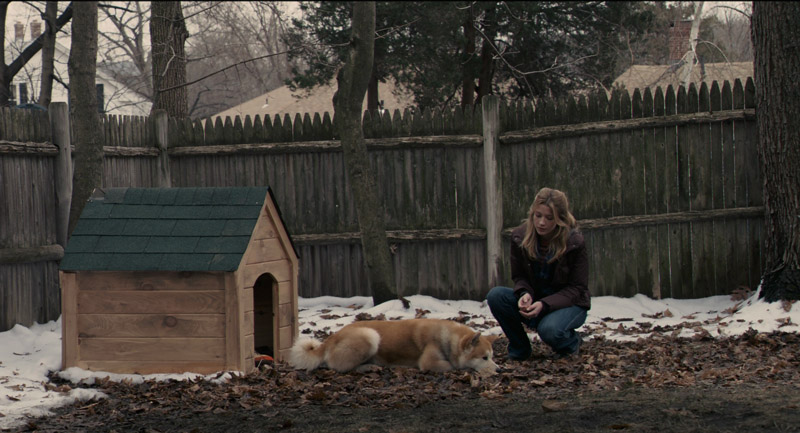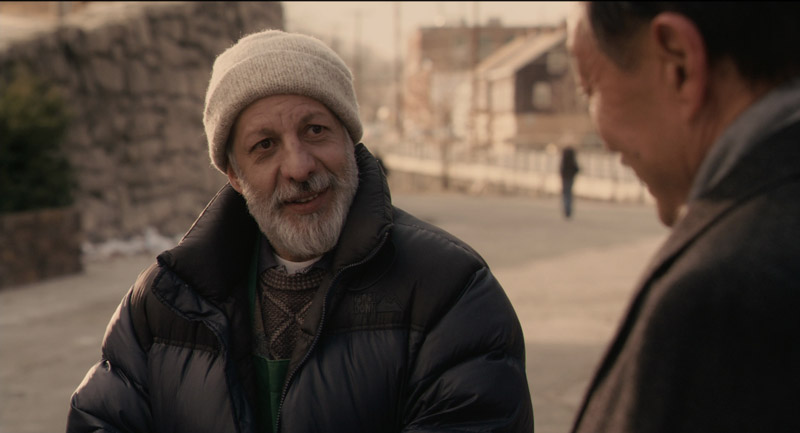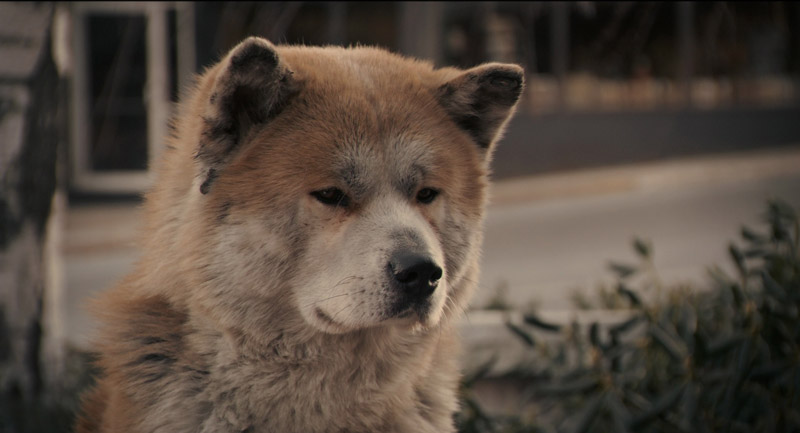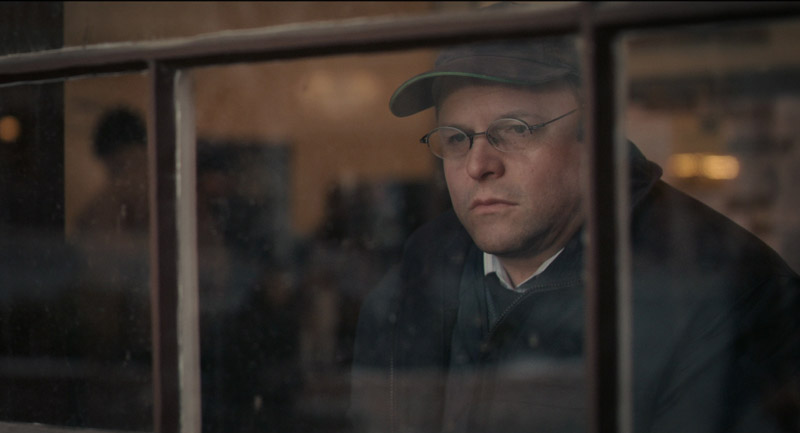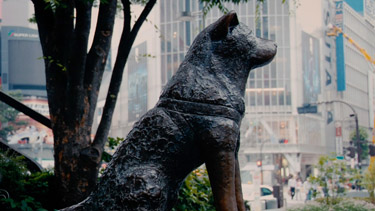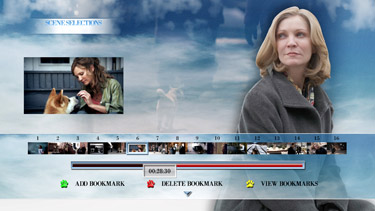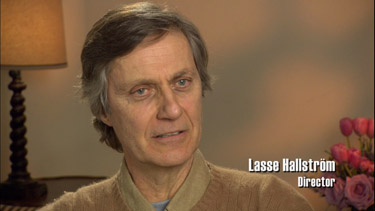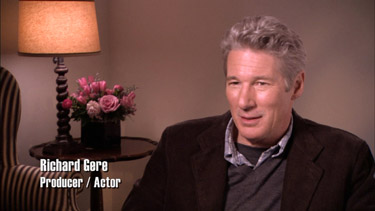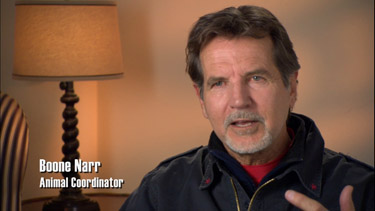Review by Leonard Norwitz
Studio:
Theatrical: Inferno
Blu-ray: Sony Pictures Home Entertainment
Disc:
Region: FREE!
(as verified by the
Momitsu region FREE Blu-ray player)
Runtime: 2:02:49.153
Disc Size: 24,768,014,368 bytes
Feature Size: 19,700,551,680 bytes
Video Bitrate: 23.70 Mbps
Chapters: 16
Case: Standard Blu-ray case
Release date: March 9th, 2010
Video:
Aspect ratio: 2.35:1
Resolution: 1080p / 23.976 fps
Video codec: MPEG-4 AVC Video
Audio:
DTS-HD Master Audio English 2881 kbps 5.1 / 48 kHz / 2881
kbps / 24-bit (DTS Core: 5.1 / 48 kHz / 1509 kbps / 24-bit)
Subtitles:
English (SDH), English, none
Extras:
• A Bond of Loyalty: The Making of Hachi – (17:45)
• MovieIQ
• BD-Live
The Film:
5
As I sat watching images of dog and man enjoying a
relationship known (to my knowledge) only to this
combination of species, it crossed my mind that I was being
manipulated to find this movie satisfying and heartwarming.
Since the story is a matter of public record (with mythic
proportions something like the sinking of the Titanic), I
feel it does no harm to detail the plot:
Dog meets Man.
Dog loves Man.
Man loves Dog.
Dog loses Man.
Dog waits.
That's the story in a knapsack.
The movie is based on the story of a real dog, enshrined by
a statue in front of the railway station in Shibuya, Japan.
That dog, also named Hachi (or, more affectionately, "Hachiko"),
was two years old when adopted by Hidesaburo Ueno back in
the 1920s. Two years later Ueno dies, but Hachi returned
every day to the train station where he used to greet his
master on his return home from work. And so it is here.
Richard Gere is a music professor at a college to which he
must commute by train every day. One evening, he finds an
Akita puppy staring up at him with a nametag and no owner to
be found. He takes him home to a delighted college age
daughter, Andy (Sarah Roemer), and wife, Cate (Joan Allen),
who is not the least bit happy about sharing her husband
with a dog.
Professor Wilson makes a few feeble attempts at getting the
word out about a lost dog – you know, flyers with photos,
that sort of thing – but secretly crosses his fingers that
he will go unclaimed. Unbeknownst to Wilson (but not to us)
Hachi was shipped all the way from Japan to one Steven Tower
(thanks to a brief flash of a torn shipping label) who
happens to live in the same small town as Wilson. But Tower
never materializes. When we learn of Hachi's rare pedigree
and worth I could feel my Grinch begin to stir: Not for a
moment do we imagine that Wilson is dognapping, but knowing
Hachi's value, that he makes no serious attempt to find its
owner is a bit unsettling. Worse yet, neither did Tower,
whom you would expect to have traced his missing dog to the
ends of the earth. I found the whole business a significant
flaw in the narrative.
Flash forward a couple years and Hachi learns to make his
own way to and from the railway station – a healthy walk –
where he arrives daily at the expected time. One day, Hachi
waits, but Professor Wilson does not get off the train, not
alive anyway. Despite efforts to offer him a new home with
Wilson's now married daughter, who loves the dog, Hachi runs
off and finds solace under a waiting freight car. Each
afternoon he waits in front of the station for a few hours
for the master who never comes. His steadfast
single-mindedness takes hold in the imaginations of the
locals, who care for Hachi's basic needs – for the next ten
years.
Now I've left out some bits: there are a few pleasant scenes
of bonding between Wilson and Hachi, and the family conflict
is well represented by wife Cate, who, thanks to Ms. Allen,
nearly steals the movie from the dog – and would have had
she been permitted more screen time. Her last scene with
Hachi tugs at the heart. As it is, the dog is smart and
gorgeous, and worth the time we spend watching him traipse
hither and yon. But Halleström, who first came to
international prominence in 1985 by way of another famous
canine with My Life as Dog, is perfectly willing, more so
than I it seems, to settle for lingering on images of
bonding, even if only one person or dog is in the frame.
There is almost no dramatic tension, nothing like Lassie
Come Home, for example, which this movie isn't the least bit
like (except for maybe 15 seconds when Hachi makes his way
from where Andy lives, a few towns distant, to his old
home.) This is different breed of movie altogether, and it
means to be. It's more like a statue in motion.
But that isn't my trouble anyway. And this is where I am in
danger of becoming the target of a fatwa by dog lovers
everywhere: Hachi is seen as an heroic example of LOYALTY –
Wilson's grandson boasts of just this trait in a
show-and-tell in his class. But if such behavior as Hachi
indulges himself in for ten years were to be expressed by a
person who lost their loved one, he or she would be
considered mentally ill. Such longterm devotion is not
considered healthy for our species. So (as I take a deep
breath and duck) my view is that from our point of view,
Hachi's "loyalty" is little more than an extension of Man's
inexorable and unbridled narcissism – as if Hachi is frozen
in mid-fetch, with Wilson as the ball. It is Hachi's nature
to be a one-master dog, and for that, the living Wilson is
as proud as a parent whose child took his first step, or
successfully negotiated their first day at school. But would
Wilson's heavenly spirit have been pleased that Hachi finds
no comfort living with his daughter? I very much doubt it.
Would you want your dog to wait for you at a city park until
he dies? Why would anyone wish such a fate on their dog?
Grief is a wondrous and difficult business. Many a dog owner
finds it difficult or impossible to own another dog after
one they loved dies – as they must, before us. Yet I
question considering it "heroic" or "loyal" to stop in one's
tracks indefinitely. I suspect many of us believe that
"moving on" jeopardizes our chances for being reunited with
our loved one in the Hereafter. Indeed, many people cannot
remarry or even date after the loss of a spouse, feeling
it's a kind of disloyalty - which kind of brings us back to
Hachi . . . or penguins.
Image:
7/8
NOTE:
The below
Blu-ray
captures were taken directly from the
Blu-ray
disc.
The first number indicates a relative level of excellence
compared to other Blu-ray video discs on a ten-point scale.
The second number places this image along the full range of
DVD and Blu-ray discs.
Taking up about 80% of its single-layered disc and making
good use of its bitrate, the AVC 1:1.85 image is warm, soft
and cuddly, with some good stretches of hi-res detail in
master shots (such as in Professor Wilson's lecture class.)
The result is more like film than video, like what I would
have expected at a small Cineplex, except for some aliasing
now and then. More often than not close-up texture is hazed
out, though color is generally quite good all around.
CLICK EACH
BLU-RAY
CAPTURE TO SEE ALL IMAGES IN FULL 1920X1080 RESOLUTION
Audio & Music:
6/7
The 5.1 DTS-HD MA mix is mostly front directed with clearly
articulated dialogue and correct localization. Ambiance,
most apparent at and around the train station, is subtle.
Jan Kaczmarek's piano score is sweet, but relentless, and at
times takes center stage ore than I would have liked. Given
the dramatic material and expected audience, the audio is
satisfactory.
Operations:
8
The menu, while a little cluttered with its time line, is
easy to use with clear thumbnails that makes for
straightforward access to chapters.
Extras:
2
A Bond of Loyalty: The Making of Hachi: A Dog's Tale begins
in Japan with the original story and how it then came to be
a movie seventy-odd years later. Cast and crew talk about
their contributions and there is some material about the
training of the dogs for the movie. The optional MovieIQ
offers a trivia track along with the feature.
Bottom line:
5
From its contrived and (no doubt, unconsciously) comical
title onward, the movie is the personification of maudlin
sentimentality. I fail to see how it does justice to the
best Dog & Man has to offer, notwithstanding the Shibuya
statue and everything it stands for. The Blu-ray image and
sound is adequate and the extra features weak.
Leonard Norwitz
March 11th, 2010
![]()
![]()

![]()
![]()
![]()
![]()

![]()
![]()

